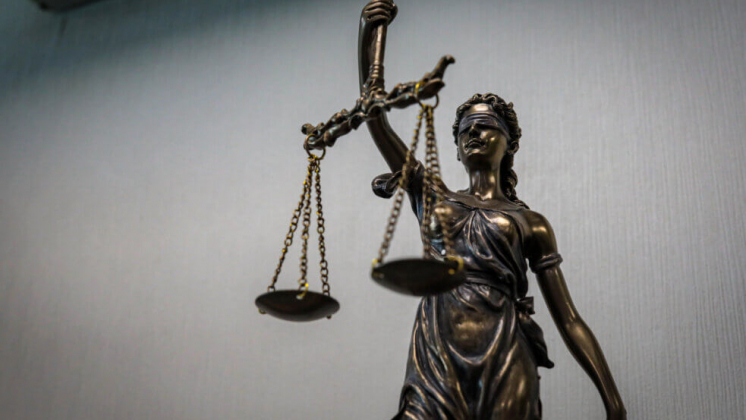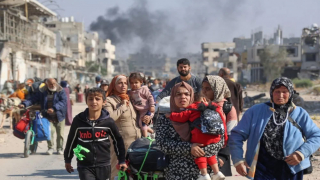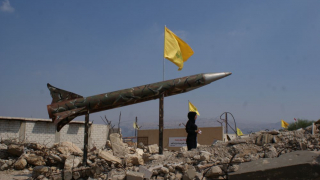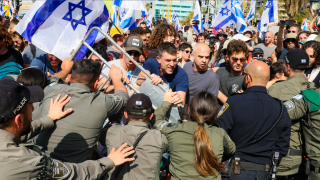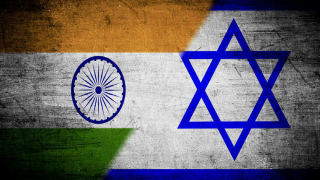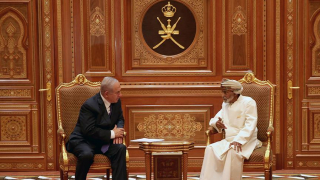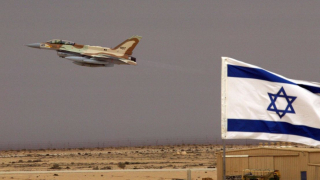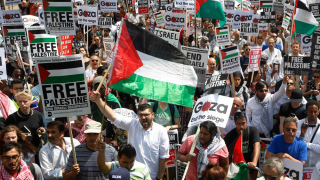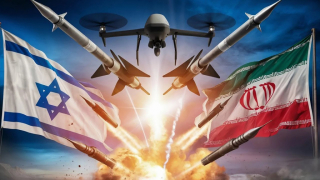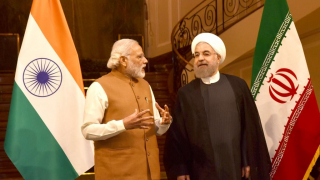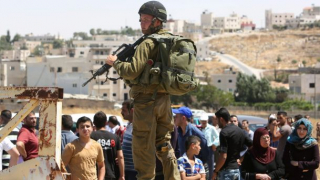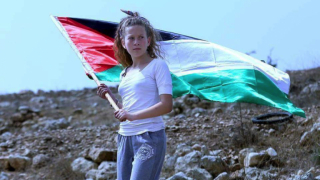International law and the conflict between Israel and Palestine
(Note: This interview was conducted before the announcement of the ceasefire between Israel and Hamas, which at the time of writing is said to start on the 19th of January and to last for six weeks.)
Dr. Najandimanesh: The ongoing conflict between Israel and Palestine has brought international law into sharp focus, particularly regarding accountability for alleged crimes committed during armed conflicts. Institutions like the International Criminal Court (ICC) and the International Court of Justice (ICJ) play a pivotal role in upholding international law, but their effectiveness depends on state cooperation and the broader international community’s willingness to prioritize justice over political interests.With this context in mind, I will now address each of your questions in turn, aiming to provide a clear and precise analysis of the legal issues you have raised.
Q: In late November 2024 the International Crime Court (ICC) issued an arrest warrant for Israeli Prime Minister Benjamin Netanyahu and former Israeli Defense Minister, Yoav Gallant. ICC's accusations against the aforementioned include war crimes, crimes against humanity, murder of civilians, persecution and a number of other inhumane actions, yet there is no specific mention of genocide. Can you explain what exactly is required for the ICC to recognize Israel's treatment of Palestinians as a genocide?
Dr. Najandimanesh: For the ICC to recognize Israel’s treatment of Palestinians as genocide, the legal criteria established in the 1948 Convention on the Prevention and Punishment of the Crime of Genocide (Genocide Convention) and Article 6 of the Rome Statute must be met.
The targeted population must belong to one of the groups protected under the Genocide Convention: national, ethnical, racial, or religious groups. Palestinians qualify as a protected group due to their distinct national, ethnic, and often religious identity.
The prosecution must prove that one or more of the following acts occurred, as defined in Article II of the Genocide Convention: killing members of the group, causing serious bodily or mental harm to members of the group, deliberately inflicting conditions of life calculated to bring about the group’s physical destruction, in whole or in part, imposing measures intended to prevent births within the group, or forcibly transferring children of the group to another group.
The most challenging element to prove is specific intent—the deliberate intent to destroy the group, in whole or in part. This requires evidence that the acts were not incidental to the conflict but aimed at the destruction of Palestinians as a group. Specific intent can be inferred from public or official statements advocating for the destruction of the group, and patterns of conduct showing a systematic attempt to eliminate the group.
To establish genocide, the ICC relies on evidence such as documentary proof, such as government communications or policies, testimonies from survivors or insiders, expert analysis of patterns of killings, forced displacements, or systemic oppression, and statistical evidence demonstrating targeted actions against Palestinians.
The prosecutor’s decision not to include genocide charges, focusing instead on crimes such as extermination and persecution, may be due to several reasons. Extermination is classified as a crime against humanity, requiring evidence of mass killings, but it does not require proof of intent to destroy a group. Genocide, on the other hand, requires specific intent to destroy a group, which is more difficult to prove. So, it was easier for the prosecutor to use the charge of extermination than genocide.
While allegations of genocide have been made by states such as South Africa and the UN Special Rapporteur, the prosecutor may have determined there is currently insufficient evidence of genocidal intent to bring charges. Notably, the ongoing case brought by South Africa against Israel at the International Court of Justice (ICJ) concerning the Genocide Convention could potentially influence future ICC proceedings. If the ICJ rules that Israel has violated the Genocide Convention, it would strengthen the ICC prosecutor’s ability to prove genocidal intent.
Israel asserts that its actions are self-defense measures against Hamas, not an attempt to destroy Palestinians as a group. The government argues that civilian casualties are unintended consequences of Hamas’s use of civilian areas for military purposes. However, as an occupying power, Israel does not have the right to invoke self-defense within occupied territories. Furthermore, genocide can occur in times of war or peace. Thus, resorting to armed conflict, even if justified, does not preclude the possibility of genocide if the required elements are met.
The prosecutor may not yet have sufficient evidence to prove genocidal intent. However, the ongoing investigation involves collecting testimonies, documents, and other materials that may reveal patterns consistent with genocide.
Proving genocide in this context is legally complex because the ICC must demonstrate beyond a reasonable doubt that Israel’s actions aim to destroy Palestinians as a group, rather than being motivated by political or military objectives (even if these are questionable). However, acts like forced displacement or large-scale killing must be shown to be part of a plan to destroy the group, not merely collateral damage.
The ICC faces political pressure in cases involving powerful states or contentious conflicts, and genocide charges carry particularly severe implications.
In my view, there is substantial evidence to prove the genocide of Palestinians, particularly in Gaza. The actus reus (criminal acts) of genocide, such as mass killings and the deliberate infliction of conditions calculated to destroy the group, are evident. Regarding mens rea (mental intent) and specific intent, statements by Israeli officials and their policies could be interpreted as incitement to genocide and evidence of an intent to destroy the Gazan population. For example, inflammatory statements from Israeli leaders, coupled with the killing of over 40,000 people, demonstrate a systematic targeting of Gazans. It is crucial to look beyond words and examine the object and purpose of these actions.
While the ICC prosecutor may have opted to prioritize crimes like extermination for political or evidentiary reasons, it is essential to remember that genocide is a legal determination, not a political one. The reluctance to charge genocide may stem more from political considerations than from a lack of legal merit.
For the ICC to recognize Israel’s treatment of Palestinians as genocide, clear and unequivocal evidence of genocidal intent must be presented. Although this is a high evidentiary standard, ongoing investigations and international pressure could result in genocide charges in the future. Meanwhile, other serious crimes such as war crimes and crimes against humanity remain significant grounds for accountability.
Q: In July 2024, the International court of justice (ICJ) published an advisory opinion concluding that Israel is committing numerous serious crimes, for example racial segregation and illegal occupation. Such a severe ruling requires action yet the United States of America and many EU states have been causing a delay in the process by opposing and using their veto rights. Meanwhile the Israeli army continues to kill civilians and humanitarian personnel. Isn't there anything in international law that could support enforcing a period of ceasefire until the necessary legal processes and investigations are fully completed?
Dr. Najandimanesh: International law provides several frameworks to support enforcing a ceasefire in situations where severe crimes, such as racial segregation, illegal occupation, and the killing of civilians, are being committed. While political obstacles often hinder implementation, the legal foundations are clear and actionable if there is sufficient international will to act.
Before delving into the details of my answer, I need to clarify that the advisory opinion is not binding on states. However, it does not constitute any new legal obligations for states or non-state actors. It only declares existing obligations in a straightforward and clear way for the international community. Therefore, there is a legal basis for states and non-state actors to implement the opinion, rooted in customary and treaty international law, erga omnes obligations, and jus cogens rules.
United Nations Security Council (UNSC): Under Chapter VII of the UN Charter, the Security Council has the authority to determine that an ongoing situation constitutes a threat to international peace and security. It can then adopt binding resolutions to impose a ceasefire. Unfortunately, the use of veto power by certain permanent members has delayed effective action in this case. Ultimately, law and humanity are sacrificed for political benefits and selectivity.
General Assembly – Uniting for Peace Resolution: When the Security Council is unable to act due to political deadlock, the General Assembly can invoke the Uniting for Peace Resolution (Resolution 377 A(V)). This allows the Assembly to recommend collective measures, such as a ceasefire, to prevent further escalation. This route has been used in other historical crises and remains a viable option in this context. To be real, might is hindering right.
The Geneva Conventions and customary international humanitarian law impose obligations on all parties to protect civilians and humanitarian personnel during armed conflict. These laws prohibit attacks on civilians and require measures to ensure their safety. States have a duty to ensure respect for these rules, including through diplomatic or economic pressure. A ceasefire could be justified as a temporary measure to uphold these principles while investigations and legal processes continue.
Neutral organizations, such as the International Committee of the Red Cross (ICRC) or the UN Secretary-General, can mediate temporary ceasefires for humanitarian purposes. These are often aimed at protecting civilians, delivering aid, and preserving evidence for investigations.
All states have a duty under customary international law and the Geneva Conventions to ensure respect for IHL. This means states can collectively take peaceful measures, including sanctions, mediation, or even non-recognition of illegal actions, to pressure the offending state into compliance.
The ICC has jurisdiction to investigate and prosecute individuals responsible for grave crimes under international law, such as apartheid, targeting civilians, and war crimes. While the ICJ’s advisory opinion is not legally binding, it reinforces the legal basis for accountability. A ceasefire could facilitate investigations and prevent further escalation of crimes.
Civil society, international NGOs, and public advocacy often play a critical role in pushing states and international organizations to act. Public demand for a ceasefire could create political momentum for enforcing one.
All states have an obligation under international law not to assist any situation that is in violation of international law. This principle requires states to refrain from supporting actions that contravene established legal norms, including those related to ceasefires and the protection of civilians. Upholding this obligation is essential for maintaining international peace and security. This is also the case for international organizations.
While the political realities are challenging, international law provides clear avenues to demand and enforce a ceasefire, especially in situations of ongoing civilian harm. What is required is collective political will from states, regional organizations, and international bodies to implement these mechanisms and prioritize the protection of human lives over political interests. The law is available; the political will to implement the law and protect humanity is missing.
Q: Could the opposing and delaying that various State parties have engaged in possibly constitute a breach of the Genocide Convention?
Dr. Najandimanesh: The Genocide Convention imposes specific obligations on States. Under certain circumstances, opposing or delaying action in response to genocide or related crimes could potentially constitute a breach of these obligations. Determining whether such behavior rises to the level of a breach requires a thorough analysis of the specific facts and legal standards. In my view, every organ of society—including journalists like you and academics like me—has an obligation under the Genocide Convention.
The Convention on the Prevention and Punishment of the Crime of Genocide (1948) creates two key obligations for State parties:
- The Duty to Prevent Genocide (Article I): States are obligated to take all reasonable measures to prevent genocide wherever it occurs. This duty applies extra-territorially and is not limited to a state’s own territory.
- The Duty to Punish Genocide (Article IV): States must ensure that individuals responsible for committing genocide are prosecuted, whether before their own courts or international tribunals, such as the International Criminal Court (ICC).
If State parties actively oppose or delay measures that could prevent genocide or hold perpetrators accountable, such conduct could be interpreted as a failure to fulfill their obligations under the Convention. Examples might include blocking United Nations Security Council (UNSC) resolutions aimed at preventing further harm, failing to cooperate with international mechanisms, such as the ICC or ICJ, in investigating and prosecuting genocide or sanctioning them, and providing direct or indirect support to the perpetrators, such as political or economic aid or transferring arms.
In the Bosnian Genocide Case (2007), the ICJ clarified that the duty to prevent genocide requires States to act within their capacity to influence the situation. A failure to act, despite having the ability to do so, could constitute a breach of this obligation. If a State has veto power at the UNSC and uses it to block measures aimed at preventing genocide, this could be interpreted as a failure to act in good faith under Article I of the Genocide Convention. Using veto power to avoid taking action against genocide is tantamount to committing an omission that endangers the existence of a protected group.
States that breach their obligations under the Genocide Convention could be held internationally responsible, and other States may bring cases against them before the ICJ. Even outside the Convention, genocide is a peremptory norm (jus cogens), meaning all States are obligated to prevent and respond to it. Delaying or opposing action could be seen as violating these broader principles.
To constitute a breach, it would need to be shown that the State’s actions (or inactions) contributed to the continuation of genocide or that they failed to take all measures reasonably within their power to prevent it. The threshold for proving such a breach is high and fact-dependent. While opposing or delaying action in the face of genocide could potentially breach the Genocide Convention, this would depend on whether the State’s conduct amounted to a failure to meet its obligations to prevent or punish genocide. Such questions would ultimately need to be assessed by a competent international court, such as the ICJ.
Q: Even after the latest announcements from ICC and ICJ, many countries are still exporting arms to Israel. Could this lead to legal consequences for them later on? For example that they have to pay restitutions to rebuild Gaza’s infrastructure and reparations to the Genocide survivors, similarily to what Germany faced after World War II?
Dr. Najandimanesh: The continued export of arms to a state accused of committing serious international crimes, despite clear warnings and legal findings by the International Criminal Court (ICC) and the International Court of Justice (ICJ), could indeed lead to significant legal consequences for those exporting states. These consequences could range from international responsibility for complicity in unlawful acts to potential obligations to pay reparations or restitution in the future. It may also result in criminal responsibility for individuals.
Under customary international law and Article 16 of the Articles on Responsibility of States for Internationally Wrongful Acts (ARSIWA), a state that aids or assists another state in committing internationally wrongful acts, such as genocide, war crimes, or crimes against humanity, may bear responsibility if the assisting state has knowledge of the wrongful act and the assistance contributes significantly to the commission of the crime. Exporting arms to a state engaged in alleged serious international crimes could qualify as aiding and abetting, particularly if it is clear that these weapons are being used to commit violations of international humanitarian law (IHL) or international human rights law.
Legal precedents on reparations and restitution include Germany after World War II, where Germany was held responsible for reparations due to its role in the Holocaust and other atrocities during the war. Similar principles could be applied if states are found to have supported acts constituting genocide or other crimes under international law. In the Bosnian Genocide Case (ICJ, 2007), the court emphasized that states must not only refrain from committing genocide but also prevent and punish it. Providing material support, such as arms, to a state accused of genocide could lead to a finding of complicity. If states are found complicit in Israel’s actions, they could be held accountable to provide reparations for harm caused, including rebuilding Gaza’s infrastructure or compensating survivors.
As mentioned above, the Genocide Convention obliges states not only to refrain from committing genocide but also to take positive measures to prevent it. Exporting arms to a state accused of genocide may breach this duty by enabling the continuation of the alleged acts. In the Bosnian Genocide Case, the ICJ found that Serbia failed to prevent genocide in Srebrenica, even though it did not directly commit it. A similar legal argument could be made for states exporting arms in the current context.
The Arms Trade Treaty (ATT) prohibits arms transfers where there is a significant risk that the weapons will be used to commit genocide, war crimes, or crimes against humanity. States party to the ATT could face legal and political consequences for violating its provisions. Even states not party to the ATT are bound by customary international law, which prohibits assisting in the commission of grave international crimes.
States harmed by arms exports enabling crimes could bring cases against exporting states in the ICJ, seeking reparations for damages caused. While states as entities are not subject to criminal prosecution, individuals within those states (e.g., officials authorizing arms exports) could potentially be prosecuted by the ICC or based on universal jurisdiction by domestic courts for aiding and abetting crimes under the Rome Statute or other relevant international law rules.
The principle of reparations, as a general principle of law, is well-established in international law. If a state is found complicit in facilitating serious crimes, it could be obligated to provide financial reparations to survivors and contribute to rebuilding infrastructure destroyed during the conflict. Exporting arms to a state accused of serious international crimes, especially after legal findings by bodies like the ICC and ICJ, carries significant legal and moral risks. Such actions could lead to future liability for complicity in violations of international law, including reparations or restitution. This should prompt exporting states to reassess their policies and prioritize compliance with their international obligations to prevent further harm and ensure accountability.
Q: Over 30 Palestinian trade unions have pleaded to their counterparts in other countries worldwide to boycott and obstruct all those who aid in arming and funding Israel . Many trade unions and movements in European countries have complied to the best of their ability without violating national laws. Grocery stores in Sweden have for example been refusing to import fruit and vegetables grown on occupied land. In the grand scheme of things these smaller boycotts may be insufficient. What do you think it will take for complete, international sanctions to be established against Israel?
Dr. Najandimanesh: Achieving comprehensive international sanctions against Israel would require a multi-faceted approach that integrates grassroots movements, legal developments, political alignment among key states, and shifts in global power dynamics. This process is highly complex and involves legal, political, economic, and strategic considerations at every stage. Given the current shortcomings of international law and its politicization, non-state actors, by implementing boycotts and sanctions, are in a good position to contribute to the promotion of the rule of international law and the protection of humanity. This is not limited to the economic and financial fields. In all aspects of international life, including sports and academics, we can activate boycotts.
Grassroots campaigns are foundational in mobilizing public opinion and pressuring governments to act. Examples include: Boycott, Divestment, Sanctions (BDS), a Palestinian-led movement growing in influence, targeting institutions and companies complicit in Israeli policies. Expanding such efforts to encompass more trade unions, academic institutions, and civil society groups is essential. Sector-specific boycotts, like Swedish grocery stores refusing to import products from occupied territories, create tangible economic impacts. Expanding these boycotts to include key industries, such as tech, arms, and finance, could amplify their effect.
We can increase coordination among global trade unions, particularly those in key industries (e.g., shipping, agriculture, and arms production). Develop public awareness campaigns targeting influential countries, such as the US and EU members, to expose the consequences of their support for Israeli policies. Engage celebrities, academics, and prominent figures to endorse boycotts and amplify their reach.
Findings from the ICJ and ICC: Recent rulings or advisory opinions from the ICJ that classify Israeli policies as crimes (e.g., apartheid, illegal occupation) can provide the legal basis for sanctions. Similarly, ICC investigations into alleged war crimes or crimes against humanity can bolster calls for accountability. UN Resolutions, such as UNSC Resolution 418 imposing a mandatory arms embargo on apartheid South Africa, demonstrate how the UN can be used to coordinate sanctions.
We can lobby for a binding UN General Assembly resolution if UNSC action is blocked by veto powers. While non-binding, it could serve as a moral and political statement to rally global support. Encourage domestic courts in countries that allow universal jurisdiction to prosecute companies or individuals complicit in Israeli policies. Work toward an international campaign for countries to withdraw their recognition of products and entities operating in occupied territories.
For sanctions to succeed, influential states must support the effort. Many Western countries are currently aligned with Israel due to strategic, economic, and political interests. Public pressure on democratic states: In democracies, public opinion can push governments to act. For example, the US faced significant domestic pressure during the Vietnam War and the South African anti-apartheid movement. Global South Leadership: Countries in the Global South, particularly within the Arab League, the African Union, and the Non-Aligned Movement, have a history of supporting the Palestinian cause. Increased coordination among these groups could strengthen calls for sanctions.
We need to build alliances between grassroots movements and sympathetic governments in the Global South to bring resolutions to the UN or regional bodies. Focus on countries with wavering positions, such as those in the EU, to shift their policies through targeted advocacy and public campaigns. Leverage economic partnerships, such as oil trade agreements, to incentivize influential countries to reconsider their support for Israel.
Economic sanctions require coordinated action to disrupt Israel’s key industries, including arms and technology trade. Israel is a leading exporter of military and surveillance technologies. Sanctions on these industries could have significant economic and operational impacts. Agriculture and trade: Products from occupied territories, such as dates and citrus fruits, remain a major export. Expanding bans on these goods would further isolate Israel economically. Divestment from international companies: Targeting multinational corporations that operate in or profit from the occupation (e.g., Caterpillar, HP, and Airbnb) would increase financial pressure.
We can encourage financial institutions to divest from Israeli companies implicated in human rights abuses. Expand consumer boycotts targeting companies with strong ties to Israel. Create trade unions or trade bloc alliances, such as within the African Union or ASEAN, to impose regional economic sanctions.
The global sanctions regime against apartheid South Africa provides a roadmap for how international sanctions can be achieved. Key takeaways include grassroots movements were key: Anti-apartheid movements created widespread public pressure on governments to impose sanctions. Regional leadership: African nations spearheaded efforts at the UN and through diplomatic channels to isolate South Africa. Economic costs: Sanctions targeted key industries, including arms, oil, and trade, severely damaging South Africa’s economy.
We can expand collaboration between Palestinian advocacy groups and existing anti-apartheid movements worldwide to link Israel’s policies to apartheid-era South Africa. Highlight the economic and reputational costs of complicity in Israel’s actions to encourage shifts in state policies.
Political realities and challenges: US veto at the UNSC: As a permanent member of the Security Council, the US continues to shield Israel from international action. It is interesting that the US sanctions the institutions of international criminal justice like the ICC. Economic dependencies: Many countries rely on Israel’s advanced technology and military exports, creating a disincentive for sanctions. Geopolitical alliances: Israel’s strategic importance in the Middle East deters some states from imposing sanctions.
Addressing the challenges requires shifting public opinion in key states like the US by highlighting the humanitarian costs and violations of international law. Working with international organizations and civil society groups to expose the complicity of multinational corporations and their governments.
Achieving comprehensive international sanctions against Israel is a long-term endeavor that requires persistent advocacy, legal action, and political mobilization. Grassroots movements, while insufficient on their own, play a critical role in building momentum and influencing state policies. A coordinated approach involving legal rulings, regional leadership, economic pressure, and public advocacy could eventually lead to meaningful action. However, this will require overcoming entrenched political and economic interests, particularly among influential states.
Q: The government of Poland has said they will not arrest Netanyahu, or any other Israeli ministers, if any of them choose to attend the 80th anniversary of the liberation of Auschwitz-Birkenau. This means that the Polish government is wilfully defying the arrest warrants issued by the ICC. Can any legal measures be taken against countries who have signed and ratified the Roman Statute but are refusing to comply with it?
Dr. Najandimanesh: The refusal of a State Party to the Rome Statute, like Poland, to comply with its obligations under the statute by not executing arrest warrants issued by the International Criminal Court (ICC) raises both legal and political questions. Below, I will give an analysis of the legal measures available and the political implications of such non-compliance.
Poland, as a State Party to the Rome Statute, is legally bound to cooperate fully with the ICC (Article 86). State Parties must provide assistance in investigations and prosecutions, including the arrest and surrender of individuals subject to ICC warrants. They must also execute arrest warrants (Article 89). Upon request by the ICC, a State Party must execute arrest warrants for individuals found on its territory.
Failure to comply constitutes a breach of its treaty obligations and results in its responsibility.
Referrals to the Assembly of States Parties (ASP) are available. Under Article 112 of the Rome Statute, the ASP oversees the implementation of the statute and addresses issues of non-compliance. The ICC could formally refer Poland’s non-compliance to the ASP, which may decide to issue a resolution condemning Poland’s actions and call for consultations to encourage compliance.
Article 87(7) of the Rome Statute allows the ICC to refer cases of non-compliance to the ASP or the UNSC. Such a referral could result in reputational damage for Poland, as it would be publicly named and shamed for undermining the international legal order.
In addition to the legal consequences, there are political consequences as well. Poland’s decision reflects its political priorities, including protecting its relationship with Israel, which has significant political, cultural, and historical resonance, especially in the context of Holocaust commemorations. The refusal might also stem from concerns over perceived interference with national sovereignty, a stance seen in other cases of ICC non-compliance. Poland is part of the EU, which broadly supports the ICC. Non-compliance could create tension within the EU, as Poland’s actions undermine the collective stance of EU members on international law. Poland may prioritize its strategic relationship with Israel and its allies, particularly the United States, over its ICC obligations.
Poland’s refusal highlights the challenges the ICC faces in enforcing its decisions, particularly when high-profile arrest warrants target individuals from politically influential states and state parties prioritize political or strategic interests over legal obligations. This situation could weaken the court’s authority and embolden other non-compliant states.
The ICC lacks enforcement powers and relies on State Parties to execute its decisions. To address this, the ASP could consider creating stronger accountability mechanisms for non-compliant states, such as financial penalties or suspension of privileges within the ASP, and propose a framework for regional enforcement agreements to increase pressure on non-compliant states.
Other State Parties and EU members could exert diplomatic pressure on Poland to comply, emphasizing the importance of upholding international law. Public condemnation and advocacy campaigns by civil society and human rights organizations could also increase the political cost of non-compliance. The EU, which is committed to upholding the ICC’s work, could take a more active role by conditioning political and economic cooperation on compliance with ICC obligations. If the EU cannot convince its members to respect the rule of international law and international institutions like the ICC, no other states are expected to do so. The EU should take a serious decision.
From a legal perspective, Poland’s actions are a clear violation of its obligations under the Rome Statute. However, the ICC’s ability to hold Poland accountable is limited to diplomatic and reputational measures, as it has no enforcement powers of its own.
The refusal to comply reflects broader geopolitical dynamics, where political considerations often take precedence over legal obligations. The ICC must navigate these dynamics carefully to avoid undermining its legitimacy while striving to enforce its decisions effectively.
Legal measures against Poland are primarily limited to referrals to the ASP or UNSC, which may result in reputational damage but are unlikely to compel immediate compliance. The situation underscores the ICC’s reliance on political will and the importance of building international consensus to strengthen enforcement mechanisms. To address such challenges, the international community must engage in coordinated diplomatic efforts, while the ICC and ASP must explore innovative strategies to ensure accountability for all State Parties.
Q: What credence does international law hold if certain people and State parties almost seem to be exempt from it? Do you think we will ever see Netanyahu and Gallant standing before the International Criminal Court?
Dr. Najandimanesh: International law is often criticized for its perceived inability to hold powerful individuals or states accountable. The question of whether figures like Benjamin Netanyahu or Yoav Gallant will ever face trial before the International Criminal Court (ICC) reflects broader concerns about the enforcement and universality of international justice.
International law’s effectiveness often depends on the political will of states. While it has significant symbolic and normative value, its enforcement mechanisms are limited, particularly when dealing with powerful states. Countries with significant geopolitical influence or alliances often resist international legal scrutiny. Selective enforcement, where international law disproportionately targets weaker states, undermines its credibility.
However, international law does have substantial achievements. It establishes norms by creating universal standards for behavior, such as the prohibition of genocide, war crimes, and crimes against humanity. Precedents in accountability, such as the cases of Slobodan Milošević, Charles Taylor, and Hissène Habré, demonstrate that even high-ranking officials can face justice.
Challenges to holding Netanyahu and Gallant accountable include Israel’s status as a non-party state to the Rome Statute. Israel is not a State Party to the Rome Statute, meaning the ICC lacks territorial jurisdiction unless the situation is referred by the United Nations Security Council (unlikely due to veto powers of allies like the U.S.) or the alleged crimes occur in the territory of a State Party, as in Palestine (recognized as a State Party by the ICC).
Netanyahu and Gallant are shielded by strong diplomatic and military alliances, especially with the United States and other influential states. This results in impunity, which encourages perpetrators to commit crimes again and again. These alliances discourage international mechanisms from pursuing accountability and often result in vetoes or political pressures to block proceedings.
Even if the ICC issues arrest warrants, enforcement depends on State Parties to the Rome Statute. Many states are unwilling to arrest leaders of powerful or geopolitically significant nations. Instances of non-compliance, such as South Africa’s refusal to arrest Sudan’s Omar al-Bashir in 2015, demonstrate the ICC’s reliance on state cooperation.
While the odds are slim, several factors could increase the likelihood of Netanyahu and Gallant facing the ICC. Shifts in global politics, such as changing alliances or domestic political changes in Israel, could alter the situation. Leaders accused of crimes could lose domestic support and face extradition under new governments. Weaker geopolitical influence of Israel or its allies could lead to less international protection. Some states might invoke universal jurisdiction to prosecute crimes, even without ICC involvement. Sustained international advocacy and legal action by human rights organizations could pave the way for future accountability.
The perceived exemption of powerful individuals and states from international law undermines its legitimacy. However, this does not mean the system is entirely ineffective. International justice often operates slowly, but it sets long-term precedents. The growing recognition of state and individual accountability, coupled with technological advancements in evidence collection, may strengthen enforcement mechanisms in the future.
While highly unlikely in the short term, history shows that political fortunes can change dramatically. Leaders who once seemed untouchable—like Augusto Pinochet or Charles Taylor—eventually faced legal proceedings. A combination of geopolitical shifts, increased international pressure, and sustained advocacy could one day bring figures like Netanyahu and Gallant before the ICC.
The criticisms we make of the international legal system are exactly the same as the criticisms that developed countries make of the legal systems of developing countries. Therefore, developed countries see as good and do in the international legal system what they consider to be a flaw in their domestic legal system. One reason for this, I think, is that in the domestic legal system of developed countries we are faced with society and human values, but in international law we are faced with the community of states and the interests of countries. That is why the violation of a legal rule in domestic law is important regardless of who committed it. While in international law, which country commits the violation is more important. For example, if Israel commits a violation, powerful and developed countries support it, while they should support the violated rule and legal value, not the perpetrator.
The enforcement of international law is deeply entwined with political realities. While its credibility is challenged by selective application, it remains a vital tool for setting global standards of justice. The possibility of Netanyahu and Gallant facing the ICC depends on the international community’s ability to transcend political interests and uphold the principles of accountability and rule of law. In the long run, as global norms evolve, even the most protected figures may not remain immune to justice.
Q: In October last year two Swedish lawyers reported Netanyahu and Gallant to the Swedish national unit against international and organized crime, but the case was dismissed supposedly on the grounds that it was not possible to conduct an investigation. Many countries have adopted universal jurisdiction and thereby are allowed to prosecute someone suspected of serious crimes against international law – even if said crime was committed abroad and against foreigners. Do you think there is any hope for a country to exercise universal jurisdiction and have Netanyahu's and Gallant's cases tried in a national court?
Dr. Najandimanesh: The principle of universal jurisdiction empowers national courts to prosecute individuals accused of committing serious international crimes—such as war crimes, crimes against humanity, and genocide—regardless of where the crimes occurred or the nationality of the perpetrators or victims. However, while this principle exists in theory and has been applied in some cases, its practical implementation in prosecuting figures like Benjamin Netanyahu and Yoav Gallant presents significant challenges.
Universal jurisdiction is enshrined in customary international law and codified in various international treaties, including the Geneva Conventions, which obligate states to prosecute or extradite individuals responsible for grave breaches of international humanitarian law, and the Convention Against Torture, which allows states to prosecute individuals accused of torture if they are present in the state’s territory. Many countries, such as Sweden, Germany, Belgium, and Spain, have incorporated universal jurisdiction into their domestic legal systems. In these jurisdictions, national courts can investigate and prosecute international crimes even if committed abroad. The problem with this jurisdiction and these countries is selectivity. This is not the first time that Sweden refuses to prosecute an Israeli official. As I remember, in 2001, there was a case against an Israeli official. It was rejected because the prosecutor was not able to do investigations in occupied territories. I think you remember the case of an Iranian national, Hamid Noury, in Sweden. In that case, legally the prosecutor was not able to conduct investigations in Iran because there was no judicial assistance agreement between Iran and Sweden. The prosecutor did not do any investigations. She only reproduced the testimonies and documents fabricated and presented by the alleged victims. I think conducting an investigation in cases against Netanyahu and Gallant was easier than in the case of an Iranian national.
Again, what happened when President Bush and Rumsfeld were accused by some victims in Belgium? What has happened to the Belgian law on universal jurisdiction? I want to say, regrettably, good legal mechanisms are misused for political ends.
Challenges to exercising universal jurisdiction include the immunity of state officials. High-ranking officials, including heads of state, government ministers, and military officials, may enjoy immunity ratione personae (personal immunity) while in office, protecting them from prosecution in foreign courts for acts performed in an official capacity. Once individuals leave office, they may still claim immunity ratione materiae (functional immunity) for acts undertaken in their official capacity. However, international law increasingly limits functional immunity in cases of serious international crimes. The International Court of Justice (ICJ) recognized head-of-state immunity in the Arrest Warrant Case (Congo v. Belgium) but noted that such immunity does not apply before international tribunals like the ICC.
For Netanyahu and Gallant, Netanyahu, as a sitting head of state, may invoke personal immunity for actions taken in this capacity. Gallant, as a former defense minister, does not enjoy immunity before domestic courts.
Political and diplomatic constraints also play a role. Many states are reluctant to pursue cases against officials from geopolitically significant countries like Israel due to political or diplomatic considerations. Allies of Israel, including the United States and some European Union countries, may exert pressure on states to avoid such prosecutions.
Evidentiary and jurisdictional hurdles present another challenge. Prosecuting alleged crimes requires substantial evidence that meets the strict evidentiary standards of national courts. Gathering evidence from conflict zones like Gaza can be challenging, as it depends on access to reliable witnesses, forensic data, and cooperation from authorities. Jurisdictional challenges may arise if states argue that the alleged crimes fall outside the scope of universal jurisdiction under their domestic law.
Procedural barriers in domestic systems are also significant. In many jurisdictions, national prosecutors often have discretion to decide whether to pursue cases under universal jurisdiction. Political considerations and resource constraints frequently lead to dismissals. For example, the Swedish national unit against international and organized crime dismissed the case against Netanyahu and Gallant, citing an inability to conduct an investigation, likely reflecting practical and political obstacles.
Factors that could facilitate prosecution include legal precedents and judicial activism. Courts in countries like Germany and Spain have demonstrated a willingness to apply universal jurisdiction. For example, German courts recently convicted Syrian officials for crimes against humanity in the Koblenz Trial under universal jurisdiction. Spanish courts pursued cases against foreign leaders, including Augusto Pinochet, under their universal jurisdiction laws.
Civil society advocacy can also play a crucial role. Persistent advocacy by human rights organizations and legal professionals can bring attention to the crimes and pressure governments to act. Documentation efforts, such as those by the UN Human Rights Council or NGOs, can strengthen the evidentiary base for prosecutions.
Changes in domestic or global politics may make certain states more willing to prosecute international crimes. Broader geopolitical changes, such as reduced international support for Israel, could open the door for legal action.
The evolving international legal framework increasingly limits immunity for serious international crimes. National courts could adopt a more expansive interpretation of universal jurisdiction, particularly in light of growing international recognition of accountability for war crimes.
While universal jurisdiction offers a legal pathway, the practical likelihood of Netanyahu or Gallant being tried in a national court is currently low due to immunity protections, political realities, and prosecutorial discretion. However, future developments could change this. Netanyahu, after leaving office, may face increased legal vulnerability as immunity protections weaken over time. A state with strong legal frameworks for universal jurisdiction, political independence, and robust evidence might initiate proceedings, especially if global opinion shifts against Israeli policies.
Universal jurisdiction provides a potential legal mechanism to prosecute Netanyahu and Gallant, but significant political, legal, and practical barriers make such prosecutions unlikely in the near term. However, the precedent set by past cases (e.g., Augusto Pinochet, Hissène Habré) demonstrates that geopolitical and legal landscapes can change, opening pathways for accountability. Persistent advocacy, robust evidence, and evolving norms in international law may eventually lead to prosecutions, even if delayed.
Q: Before we conclude this interview: is there anything else you would like to say?
Dr. Najandimanesh: As we stand at the intersection of law and humanity, the responsibility to uphold international justice has never been more pressing. While some may believe that political power can shield individuals from accountability, we must remain unwavering in our commitment to ensuring that no one is above the law, regardless of their position or influence. The strength of international law lies not in its perfection, but in its relentless pursuit of justice, even in the face of opposition.
The challenges we face in enforcing international law are significant, but they are not insurmountable. The refusal to act against perpetrators of the most heinous crimes is not an option. Every failure to prosecute, every political compromise, every attempt to shield those responsible for war crimes or crimes against humanity only deepens the suffering of the innocent and undermines the very foundations of global justice.
We must recognize that justice is not a privilege; it is a universal right. A world where impunity thrives is a world that risks descending into chaos and despair. Our collective responsibility as a global community is clear: we must ensure that those who perpetrate crimes against humanity, war crimes, and acts of genocide face the full weight of the law. It is not just about holding individuals accountable—it’s about sending a powerful message that international law will no longer be a tool for the powerful few, but a shield for the oppressed, the vulnerable, and the defenseless.
The path forward will not be easy, but it is necessary. We must continue to demand action, support justice, and refuse to let political considerations undermine the rights of those who have suffered the most. It is not enough to speak of justice; we must act, persist, and hold those in power accountable. The fight for justice is not merely an aspiration—it is an imperative, and it will not stop until the law is respected, enforced, and upheld.

